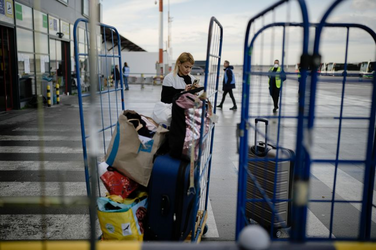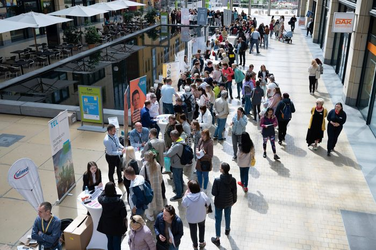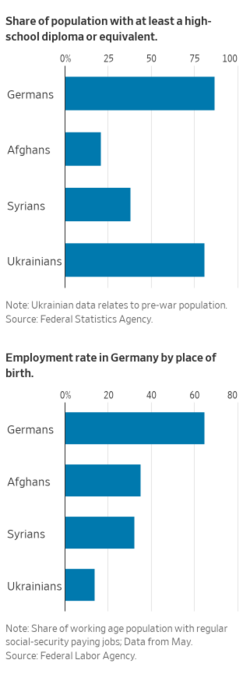
A temporary refugee shelter at the former Tegel airport in Berlin, where some Ukrainians are fleeing to escape Russian attacks on their country.
PHOTO: MARKUS SCHREIBER/ASSOCIATED PRESS
By Tom Fairless
Dec. 12, 2022 6:35 am ET
KASSEL, Germany—In 2016, as Middle Eastern refugees fled to Germany in their hundreds of thousands, Ingo Neupert decided to help.
A professor of social work, he started a training program in western Germany for 25 young refugees to become nurses and medical assistants.
Only three of them graduated from the 4½ year program, Mr. Neupert said. In a second, shorter program, about one-third of the candidates reached the end. The project is now on hold, according to Essen University Hospital, western Germany, where it took place.
Germany faces a paradox: After years of record immigration that has seen the equivalent of the population of a large city arrive in the country every year, one in six people in Germany was now born overseas, compared with one in seven in the U.S.
But unlike the U.S., Germany is failing to find work for the newcomers despite a worsening labor shortage that is stifling economic growth. Europe’s largest economy will in addition need to fill about seven million jobs by 2035 as older workers retire, economists estimate.
Experts have long pointed to immigration as the solution, saying Germany needs some 400,000 skilled immigrants each year.
So far, the current mix of immigrants isn’t filling the gap. Official data show that only about a third of the roughly 800,000 working-age Syrians and Afghans in Germany have a taxpaying job, compared with two thirds of Germans, even though most arrived over five years ago. Unemployment among foreigners is about 12%, and under 5% for Germans. In the U.S., foreigners are more likely to have jobs than locals.
The main problem: Many refugees are poorly suited for jobs in Germany’s highly skilled labor market and Germany hasn’t been very good at training them.

A job fair for refugees from Ukraine in Dresden, Germany, in May. Experts say refugees and labor migrants are now competing for the same infrastructure.PHOTO: SEBASTIAN KAHNERT/ASSOCIATED PRESS
To change that, Berlin is planning to introduce a points-based immigration system modeled on Australia’s or Canada’s next year, hoping to woo better-qualified foreigners, but migration experts are skeptical. Even if it succeeds, Germany will likely continue to receive large numbers of asylum seekers it can’t employ, who will fill the ranks of welfare recipients or boost crime statistics, where they are already overrepresented.
“Refugees and labor migrants will be competing for the same infrastructure,” said Thomas Liebig, a migration expert at the Organization for Economic Cooperation and Development, a Paris-based economic think tank.
Labor migrants currently only make up one in 10 new arrivals to Germany, compared with one in three to Canada. An earlier European program to draw skilled foreigners, known as the Blue Card, attracted about 70,000 workers to Germany in total over the past decade.
Now refugee numbers are soaring again after a lull during the pandemic, driven by the war in Ukraine and growing emigration from the Middle East, Africa and Afghanistan. In the first half of the year, more than one million people moved to Germany—considerably more than in 2015, when then-Chancellor Angela Merkel welcomed Syrian refugees.
At the job center in Kassel, a town in central Germany, Wolf-Detlef Zeising says he has had a hectic year preparing hundreds of Ukrainian refugees to enter Germany’s labor market. He has deployed 20 Ukrainian interpreters over the summer. His staff say they are advising 60% more people a day than in normal times.
Even so, Mr. Zeising said he doesn’t expect many of the newcomers to get jobs in Germany before 2024, because of delays in finding and then attending language and integration courses.
Meanwhile half of German businesses say they are cutting back their operations or relocating abroad because they can’t find enough workers. Germany’s unemployment rate, at 5.5%, is close to full employment.

“The reality is, it is refugees or nothing,” said Anke Dobbeck, who runs a heating and plumbing company in southwest Berlin. She recently hired a young Afghan after he completed a 3½ year apprenticeship with her company.
The integration process required “a lot of strength and support,” she said. The man needed help with documents and accommodation. Another refugee signed an apprenticeship contract but didn’t show up after the first day, Ms. Dobbeck said.
German railway operator Deutsche Bahn has hired some 26,000 new employees this year, partly to fill gaps in its workforce as older staff retire. The company has 900 recruiters and it is actively recruiting in more than 10 countries, said Kerstin Wagner, Deutsche Bahn’s executive vice president for talent acquisition. Around 23% of new recruits this year were born outside Germany.
Even so, recruitment of refugees is modest. The company this year spoke to 3,200 potential recruits from Ukraine and hired 65, Ms. Wagner said. About 3.5% of the company’s new recruits come from traditional refugee-sending countries including Syria, Ukraine, Afghanistan, Iraq, South Sudan, Venezuela and Myanmar.
Qualifications are the main problem. Only around one-third of Germany’s Syrian migrants have graduated high school or technical school, compared with 70% of immigrants from Poland, according to the German statistics agency.
At the same time, job seekers face high hurdles in a rigid labor market that protects incumbents, requires lengthy traineeships and rarely recognizes foreign degrees, often forcing even specialists to retrain from scratch. Helge Scheele, an integration specialist at Kassel’s job center, estimates that only 5% of his clients who fled the Middle East and Africa since 2015 managed to qualify as skilled workers in Germany.
Rami Alhamei, a 36-year-old lawyer from Damascus who lives in the east German city of Halle, has been looking for work since he arrived seven years ago, without success. He says he has sent around 500 applications, spent roughly 18 months in various language, integration and IT courses, and now speaks good German.
He said he can’t work as a lawyer in Germany because he only has a Bachelor’s degree, not a Master’s. Two Syrian acquaintances completed the two-year Master’s course that is necessary to work but still couldn’t find a job, he said.
“I would like to integrate in Germany, but it is very difficult,” he said
Despite those frustrations, two of his brothers recently joined him. “It’s better here than in Syria, where there is still war,” he said.
Johannes Hoppe, a psychologist in Halle, has been helping Mr. Alhamei for three months as part of a local voluntary project. He said he has helped two out of roughly half a dozen refugees to find work in recent years. One, a Syrian engineer, secured a three-year apprenticeship in southern Germany but dropped out after being told that his German wasn’t good enough. A second found work in the labor agency, helping refugees to find jobs.
Another problem: The supply of workers from European Union countries such as Poland, who tend to be more qualified than refugees from the Middle East and Africa, has slowed sharply since the start of the pandemic, according to OECD data.
“As long as so many people come here for humanitarian reasons there is not much room for qualified work migration,” said Udo Marin, managing director of the Association of Berlin Merchants and Industrialists, a trade group.
Appeared in the December 13, 2022, print edition as 'Migrants Struggle to Get Jobs Amid German Worker Shortage'.
Source (Archive)
